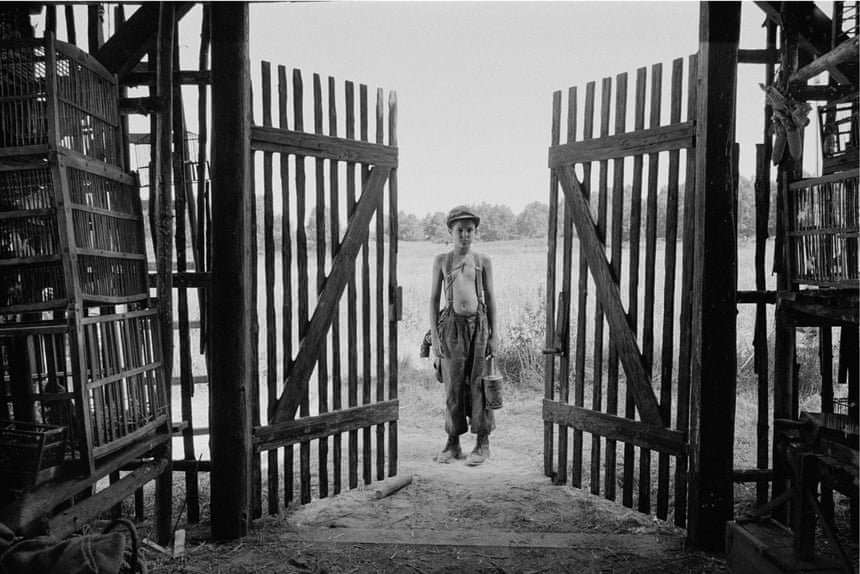 The Painted Bird review – savage, searing three-hour tour of hell
The Painted Bird review – savage, searing three-hour tour of hell
Xan Brooks
Stellan Skarsgård, Harvey Keitel and Udo Kier star in this phantasmagorical horror about eastern Europe that saw half the Venice audience walk out. I couldn’t look away
 Pitiless chronicle … Barry Pepper in The Painted Bird. Photograph: Jan Dobrovský
Pitiless chronicle … Barry Pepper in The Painted Bird. Photograph: Jan Dobrovský
One day they’ll make a film about the first public screening of The Painted Bird, inside the Sala Darsena at the 2019 Venice film festival. It will feature the man who fell full-length on the steps in his effort to escape and the well-dressed woman who became so frantic to get out that she hit the stranger in the next seat. The centrepiece will be the moment 12 viewers broke for the doors only to discover that the exit had been locked. I’m seeing this film as a disaster movie along the lines of The Towering Inferno, or perhaps a slapstick comic version of The Painted Bird itself.
Film festivals need masterpieces to marvel at and turkeys to laugh about. But they also need a film like The Painted Bird, a film that makes a mockery of star ratings. I can state without hesitation that this is a monumental piece of work and one I’m deeply glad to have seen. I can also say that I hope to never cross its path again.
Czech director Václav Marhoul spins war-torn history into phantasmagorical horror, rattling around ravaged eastern Europe for just shy of three hours. The Painted Bird is adapted from a 1965 novel by Jerzy Kosiński, which was cobbled together from survivors’ accounts, and takes its title from a scene in which a starling daubed with white paint is mistaken for an enemy and pecked to death by its flock. The movie shows this incident in complete grisly detail. It’s one of its lighter, gentler moments.
 Tormented … Petr Kotlar in The Painted Bird. Photograph: Jan Dobrovský
Tormented … Petr Kotlar in The Painted Bird. Photograph: Jan Dobrovský
Petr Kotlar plays the unnamed Jewish stray, identified in the credits only as Boy. He’s part Odysseus, part Job in that the tale has him caught in the eddies of the second world war, washed from one nightmarish episode to the next. Marhoul shot the film over several years, so that we watch Kotlar ageing as the movie progresses. He fills out on screen as the audience thins out.
The first mass walk-out is prompted by Udo Kier’s jealous miller, who gouges out a man’s eyes and then feeds them to his cats. The second, most violent exodus occurs when the local nymphomaniac (Jitka Čvančarová) is set upon by the townsfolk, while the third is so perfectly synchronised to a Cossack attack that the desperate dash of the spectators mirrors that of the villagers on screen. After it’s over, the auditorium is hardly half full. Those who remain have decided to ride the rollercoaster right through.
Judged purely on visual terms, The Painted Bird is gorgeous: a lush black-and-white tour of birch forests and bulrushes and remote rustic hamlets. Judged as drama, it is brazenly brutal, a pitiless chronicle of a land red in tooth and claw, so steeped in primitive suspicions that it’s startling to suddenly see a 20th-century plane or a truck, or spot actors from less threatening pictures. Look, there’s Stellan Skarsgård playing a foursquare German; Harvey Keitel as a misguided Catholic priest; Julian Sands as the paedophile parishioner who is eager to take the boy in. Sands is in a death scene that may haunt me for weeks.
Marhoul’s film is unremittingly savage and searing. It knows exactly what it’s doing and, by that logic, never puts a foot wrong. What this sets out to depict is an eastern Europe in crisis, rocked by war with its core melting down and psychosexual radiation bleeding into the surrounding countryside. The boy is so tormented and traumatised that it’s small wonder he eventually becomes a tormentor, too.
The Painted Bird plumbs the depths, but rest assured that those hardy souls who stay the course are rewarded with the smallest glimmer of hope. This takes the form of a few lines drawn in the condensation of a bus window. After three hours in hell a lone crumb of comfort can fill us up like a banquet.
